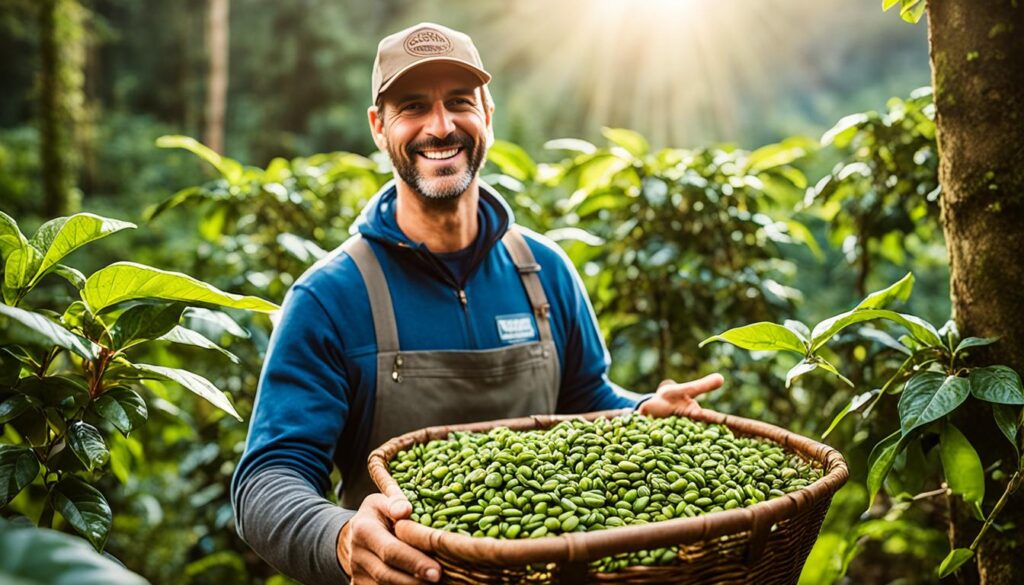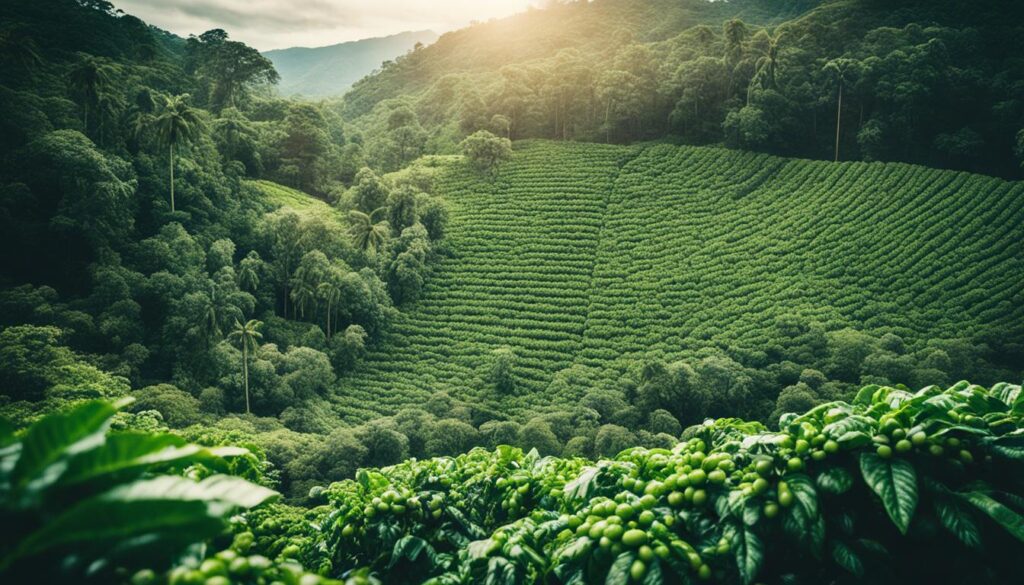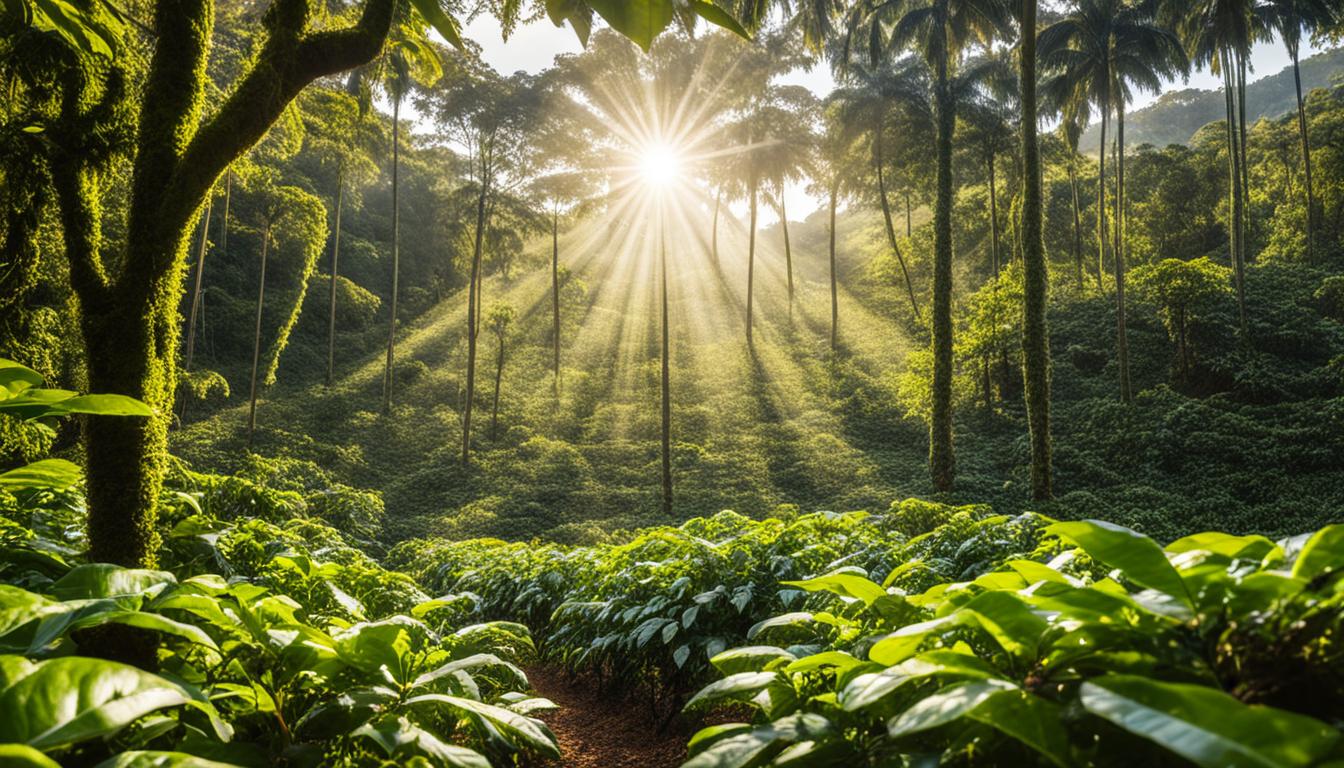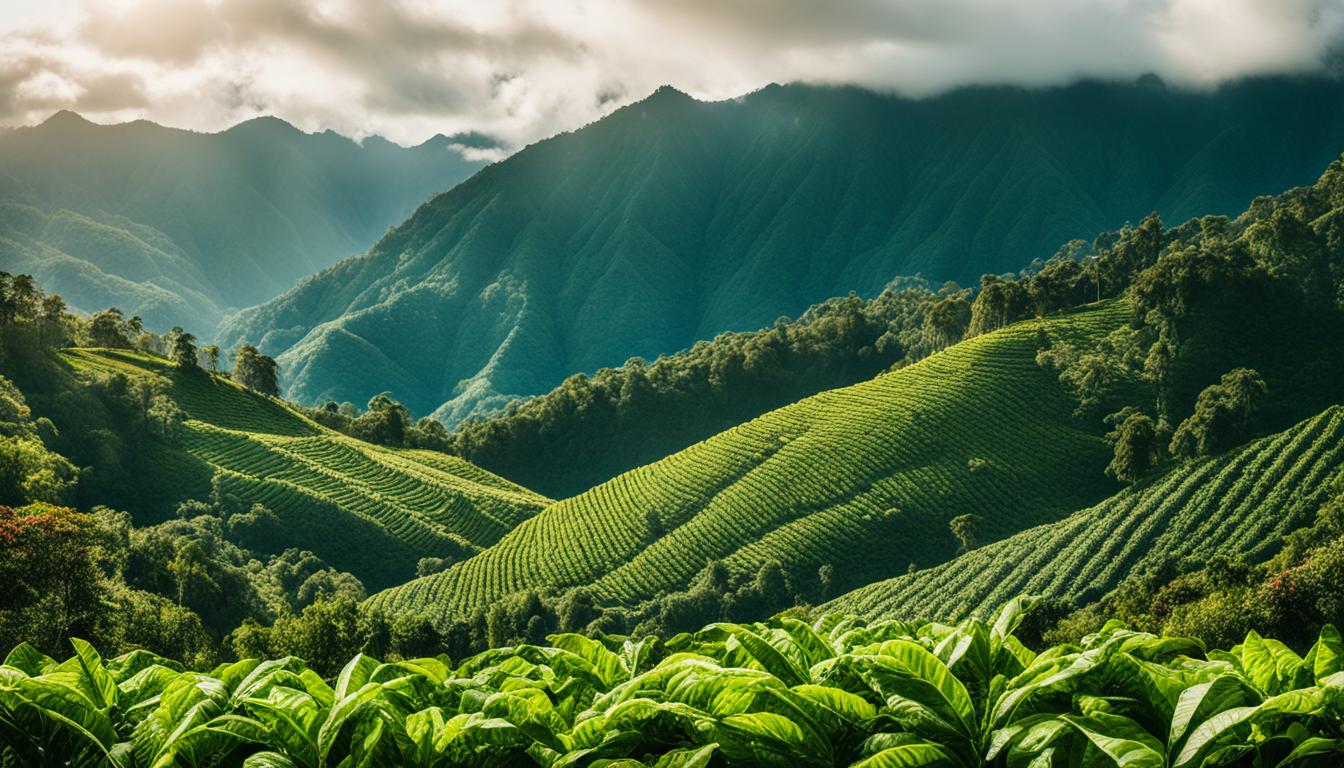Welcome to our article on shade-grown coffee! Today, we’ll explore the fascinating world of shade-grown coffee and uncover its many benefits. If you’re curious about eco-friendly coffee production and the advantages it brings, you’re in the right place.
Shade-grown coffee refers to coffee that is cultivated under a canopy of trees, providing a habitat for a diverse range of plant and animal species. This sustainable farming practice has numerous advantages, both for the environment and the quality of the coffee itself.
By promoting biodiversity and natural pest control, shade-grown coffee farms contribute to a healthier ecosystem. These farms also have improved soil quality and are more resilient to the impacts of climate change. As a result, the coffee produced in these farms boasts richer flavors and a more complex profile.
So, join us as we delve into the world of shade-grown coffee, exploring its environmental impact, benefits for farmers, economic potential, global significance, and the science behind it. Discover why shade-grown coffee is the eco-friendly choice for conscious consumers. Let’s get started!
Key Takeaways:
- Shade-grown coffee is cultivated under a canopy of trees, providing habitat for diverse plant and animal species.
- Shade-grown coffee promotes biodiversity, natural pest control, and improved soil quality.
- Coffee produced in shade-grown farms offers richer flavors and a more complex profile.
- Shade-grown coffee farming has a lower environmental impact compared to conventional sun-grown coffee farming.
- Shade-grown coffee offers economic benefits for farmers and supports ethical coffee cultivation.
The Environmental Impact of Shade-Grown Coffee
When it comes to sustainable coffee farming and eco-friendly coffee production, shade-grown coffee stands out as a remarkable alternative to conventional sun-grown methods. The environmental benefits of shade-grown coffee farming have been extensively studied and documented. These findings highlight the positive impact that shade-grown coffee has on the environment and the preservation of natural ecosystems.
“Shade-grown coffee plantations experience reduced soil erosion compared to sun-grown plantations.”
A study conducted in the Venezuelan Andes revealed that shade-grown coffee plantations exhibit significantly lower rates of soil erosion when compared to sun-grown plantations. This is due to the protective canopy of shade trees that shields the soil from heavy rains and reduces water runoff, preserving its structure and fertility.
“Shade-grown coffee farms support a higher diversity of bird species, promoting natural pest control.”
One of the notable advantages of shade-grown coffee farming is its ability to support a rich biodiversity of bird species. In comparison to sun-grown coffee farms, shade-grown plantations provide a habitat for a diverse range of birds that act as natural pest controllers, reducing the need for chemical pesticides.
The presence of shade trees in these coffee farms goes beyond supporting bird populations. They also provide vital habitats for other wildlife, such as mammals and insects, contributing to overall ecosystem balance and resilience.
By reducing soil erosion, promoting biodiversity, and minimizing the use of chemical pesticides, shade-grown coffee farming plays a crucial role in sustainable agriculture and the protection of our environment.
The Benefits of Shade-Grown Coffee for Farmers
Shade-grown coffee offers numerous benefits for coffee farmers. By adopting ethical coffee cultivation practices, farmers can contribute to the preservation of the environment while also improving the quality of their coffee beans. The shade provided by trees in shade-grown coffee farms helps create a natural habitat for beneficial insects and birds, reducing the need for expensive chemical pesticides and promoting natural pest control. This not only reduces the cost of production but also ensures that the coffee beans are free from harmful chemicals, making them more appealing to ethically conscious consumers.
In addition to the environmental advantages, shade-grown coffee is often associated with ethical coffee cultivation practices. When coffee is grown under the shade, it helps protect the forest ecosystem, conserving biodiversity and preventing deforestation. Shade-grown coffee farms contribute to the preservation of indigenous flora and fauna, providing a more sustainable model of coffee farming.
“Shade-grown coffee offers farmers an opportunity to align their practices with ethical coffee cultivation while also reaping financial rewards.”
Moreover, shade-grown coffee certification programs, such as the Bird Friendly® Coffee Certification, further enhance the reputation and marketability of coffee beans. Farmers who obtain this certification can tap into a niche market that values sustainable and eco-friendly coffee production. This certification assures consumers that the coffee they are purchasing is grown under specific shade and biodiversity criteria, meeting strict environmental and social standards. By participating in shade-grown coffee certification programs, farmers can access larger markets, command higher prices for their beans, and ensure the long-term viability of their coffee farming operations.
The Economic Advantages
Aside from the environmental and ethical benefits, shade-grown coffee can have economic advantages for farmers. Some shade-grown coffee farms incorporate fruit trees within their plantations, creating additional income streams. The fruit trees not only provide shade but also bear fruits, adding value to the overall production. Farmers can sell these fruits as a complementary product, increasing their revenue while diversifying their income sources.
Furthermore, the popularity of shade-grown coffee continues to rise, with increasing consumer demand for ethically and sustainably produced coffee. By embracing shade-grown coffee practices and obtaining certification, farmers position themselves to cater to this growing market segment. This can result in higher prices for shade-grown coffee beans and increased profits, creating a win-win situation for both farmers and consumers.
Summary
Shade-grown coffee provides multiple benefits for coffee farmers. It enables them to cultivate coffee in an environmentally friendly manner, reducing the use of pesticides and preserving biodiversity. Additionally, shade-grown coffee is associated with ethical coffee cultivation practices, appealing to consumers who prioritize sustainability and environmental conservation.
By participating in shade-grown coffee certification programs, farmers can enhance the marketability of their beans, tap into niche markets, and command higher prices. The economic advantages, coupled with the environmental benefits, make shade-grown coffee a compelling choice for coffee farmers who are committed to ethical and sustainable coffee cultivation practices.
The Economics of Shade-Grown Coffee
Shade-grown coffee offers economic advantages for both farmers and consumers. A study conducted in Jamaica revealed that incorporating fruit trees as shade in blue mountain coffee agroecosystems can enhance the economic potential of coffee farms. The shade trees not only provide additional income from the fruits they produce but also contribute to biodiversity and ecosystem services.
“The incorporation of fruit trees in shade coffee production systems help promote agroecosystem diversification, increase farm income, and enhance biodiversity conservation.”
In addition to diversifying farm income, shade-grown coffee farms that obtain certification, such as the Smithsonian Migratory Bird Center’s Bird Friendly® Coffee Certification, gain access to niche markets and can command higher prices for their coffee. This certification ensures that the coffee is grown under specific shade and biodiversity criteria while meeting strict environmental and social standards.
Consumers can actively support shade-grown coffee by choosing to purchase from the best shade-grown coffee brands. By doing so, they directly contribute to the economic well-being of coffee farmers and promote sustainable coffee farming practices.
Benefits of Shade-Grown Coffee Certification
Shade-grown coffee certification, such as the Bird Friendly® Coffee Certification, provides several benefits:
- Higher market demand and premium prices
- Enhanced reputation and marketability
- Promotion of environmental conservation and sustainability
- Meeting strict shade and biodiversity criteria
| Benefits | Shade-Grown Coffee Certification |
|---|---|
| Higher market demand and premium prices | ✔ |
| Enhanced reputation and marketability | ✔ |
| Promotion of environmental conservation and sustainability | ✔ |
| Meeting strict shade and biodiversity criteria | ✔ |

By supporting shade-grown coffee certification programs and choosing the best shade-grown coffee brands, consumers not only enjoy a premium coffee experience but also contribute to the economic viability of coffee farming and the preservation of biodiversity.
The Global Significance of Shade-Grown Coffee
The cultivation of shade-grown coffee holds tremendous global significance, contributing to biodiversity conservation and sustainable agriculture practices. Shade-grown coffee farms provide essential habitats for various bird species, including migratory birds, thus playing a crucial role in their conservation efforts. Research conducted in Latin America has shown that shade-grown coffee farms support higher bird populations compared to sun-grown coffee farms, highlighting their importance for avian biodiversity.
In particular, shade-grown coffee plantations serve as crucial stopovers for migratory birds such as the cerulean warbler during their arduous journeys. These birds rely on the shade trees in coffee farms to rest, refuel, and find shelter. By supporting shade-grown coffee production and certification programs, consumers and coffee enthusiasts actively participate in preserving the migratory routes and habitats of these magnificent birds, contributing to global bird conservation efforts.
By choosing shade-grown coffee, consumers promote sustainable and environmentally friendly coffee farming practices, which in turn aid the preservation of biodiversity. Shade-grown coffee farms create a harmonious ecosystem where shade trees provide vital habitats for a diverse range of plants, animals, and insects. The presence of these shade trees not only enhances biodiversity but also contributes to natural pest control, reducing the need for chemical pesticides and protecting both the environment and farm workers from potentially harmful substances.
Furthermore, supporting shade-grown coffee certification programs ensures that farmers adhere to specific shade and biodiversity criteria, promoting sustainable agriculture practices. Certification programs, such as the shade-grown coffee certification provided by reputable organizations, guarantee that the coffee is grown in a manner that safeguards the environment and supports local communities.
Preservation of Biodiversity
The global significance of shade-grown coffee extends beyond bird conservation. Shade-grown coffee farms also provide habitats for other wildlife, including mammals, insects, and amphibians. These diverse ecosystems foster resilience and ecological balance by creating a natural environment that mimics the forest’s complexity.
Additionally, shade-grown coffee farming contributes to the conservation of the rainforest, as shade trees used in coffee plantations often consist of native tree species. This promotes the preservation of forest cover and the protection of delicate ecosystems that serve as vital carbon sinks.
Supporting Sustainable Agriculture Practices
The adoption of shade-grown coffee farming supports sustainable agricultural practices on a global scale. Such practices aim to reduce the environmental impact of coffee production while ensuring the economic viability and social equity of coffee farming communities.
Shade-grown coffee farms contribute to sustainable agriculture by improving soil quality and reducing soil erosion. The presence of shade trees helps retain moisture, prevents excessive evaporation, and protects the soil from the erosive forces of heavy rainfall. This, in turn, helps to maintain healthy soil, essential for promoting crop growth, preserving essential nutrients, and mitigating the negative effects of climate change.
| Sustainable Agriculture | Benefits |
|---|---|
| Preserves Biodiversity | Supports habitats for diverse flora and fauna |
| Reduces Soil Erosion | Protects soil from erosion, maintains soil fertility |
| Minimizes Chemical Inputs | Promotes natural pest control, reduces reliance on chemical pesticides |
| Promotes Climate Resilience | Enhances the farm’s ability to withstand climate change impacts |
| Contributes to Social Equity | Supports sustainable livelihoods for coffee farmers and their communities |
By choosing shade-grown coffee and supporting sustainable farming practices, consumers can be active participants in promoting the preservation of biodiversity, protecting natural ecosystems, and creating a more sustainable future for coffee farming communities worldwide.
The Future of Shade-Grown Coffee
The future of sustainable coffee farming lies in the hands of coffee farmers, consumers, and industry stakeholders alike. With the looming threat of climate change, the importance of shade-grown coffee farms becomes even more apparent. These farms offer a more resilient and sustainable system that can adapt to changing environmental conditions.
However, the conversion of shade coffee farms to intensive sun systems presents a significant challenge. The allure of higher yields and quicker harvests can be tempting, but it comes at the expense of the environment and the long-term sustainability of coffee production.
To ensure the continued growth of shade-grown coffee, it is crucial to support certification programs and initiatives that promote sustainable coffee farming practices. These programs, such as shade-grown coffee certification, set strict standards for environmental stewardship and social responsibility. By investing in shade-grown coffee certification, farmers and consumers can contribute to the preservation of biodiversity and the sustainability of coffee production.
By making conscious choices and supporting the best shade-grown coffee brands, consumers can play a crucial role in shaping the future of coffee farming. Their demand for sustainable and ethically produced products sends a powerful message to the industry. Together, we can create a more sustainable future for coffee, one cup at a time.
| The Future of Shade-Grown Coffee | |
|---|---|
| Key Factors | Actions |
| Sustainable Coffee Farming | Support certification programs |
| Shade-Grown Coffee Certification | Choose shade-grown coffee brands |
| Consumer Demand | Promote sustainable and ethical coffee |

The Science Behind Shade-Grown Coffee
The scientific literature provides extensive evidence for the benefits of shade-grown coffee. Studies have shown that shade-grown coffee farms support higher biodiversity, with a greater variety of plant and animal species compared to sun-grown coffee farms.
Shade trees in these farms provide crucial habitat for birds, insects, and mammals, contributing to natural pest control and promoting a balanced ecosystem. This natural pest control reduces the need for chemical pesticides, making shade-grown coffee a more eco-friendly choice.
Furthermore, shade-grown coffee farms have been found to have lower soil erosion rates and improved soil quality compared to sun-grown coffee farms. The shade provided by the trees helps to protect the soil from erosion caused by wind and water, preserving the fertility of the land.
A study conducted in Costa Rica found that shade-grown coffee farms had significantly lower erosion rates compared to sun-grown coffee farms. This is attributed to the protective canopy of the shade trees, which minimizes the impact of heavy rainfall on the soil.
These scientific findings highlight the ecological benefits of shade-grown coffee, making it a more sustainable and environmentally friendly alternative to conventional coffee farming practices. By choosing shade-grown coffee, we can support eco-friendly coffee production and contribute to the preservation of biodiversity.
Comparing Shade-Grown and Sun-Grown Coffee
Shade-grown coffee has distinct advantages over sun-grown coffee when it comes to environmental sustainability. Here is a comparison between the two:
| Factors | Shade-Grown Coffee | Sun-Grown Coffee |
|---|---|---|
| Biodiversity | Supports higher biodiversity with a greater variety of plant and animal species. | Supports lower biodiversity with fewer plant and animal species. |
| Natural Pest Control | Provides habitat for birds, insects, and mammals that contribute to natural pest control, reducing the need for chemical pesticides. | Requires more chemical pesticides for pest control. |
| Soil Erosion | Experiences lower erosion rates due to the protective canopy of shade trees. | More prone to soil erosion, especially during heavy rainfall. |
| Soil Quality | Has improved soil quality due to the organic matter and nutrient recycling provided by shade trees. | May have poorer soil quality due to nutrient depletion and erosion. |
By choosing shade-grown coffee, we can support sustainable coffee farming practices that prioritize biodiversity conservation and environmental protection.
Conclusion
After exploring the world of shade-grown coffee, we have uncovered a myriad of benefits for the environment, coffee farmers, and consumers. Shade-grown coffee not only promotes the conservation of biodiversity but also enhances soil quality and gives rise to a more sustainable and resilient approach to coffee farming. By consciously choosing shade-grown coffee and supporting shade-grown coffee certification programs, we can actively contribute to the preservation of our planet’s rich biodiversity and the promotion of sustainable agricultural practices.
One of the remarkable aspects of shade-grown coffee is its economic potential for farmers. By cultivating shade-grown coffee, farmers can tap into additional income streams through the sale of fruits produced by shade trees. This approach not only boosts their economic resilience but also underscores the importance of diversifying farming practices. Furthermore, shade-grown coffee farms that obtain certification, such as the esteemed shade-grown coffee certification, demonstrate their commitment to environmental sustainability and gain access to niche markets that value these eco-friendly and high-quality beans.
To truly savor the unique benefits of shade-grown coffee, we recommend seeking out organic coffee beans from the best shade-grown coffee brands available in the market. These brands uphold the principles of shade-grown coffee, ensuring the preservation of biodiversity and the creation of rich flavors. By supporting these brands, we not only indulge in a delightful coffee experience but also actively contribute to the overall sustainability and well-being of our planet. So let’s make a conscious decision to embrace shade-grown coffee and savor its many rewards.
FAQ
What is shade-grown coffee?
Shade-grown coffee refers to coffee that is grown under a canopy of trees, providing a natural shade cover for the coffee plants.
What are the benefits of shade-grown coffee?
Shade-grown coffee offers numerous benefits, including promoting biodiversity, enhancing soil quality, and producing higher-quality coffee with richer flavors.
How is shade-grown coffee farming more eco-friendly?
Shade-grown coffee farming promotes sustainable practices by providing habitat for a greater variety of plant and animal species, reducing the need for chemical pesticides and promoting a balanced ecosystem.
How does shade-grown coffee benefit farmers?
Shade-grown coffee farming reduces pest and disease pressure, leading to lower input costs for farmers. It also allows farmers to market their coffee as ethically produced and environmentally friendly, potentially commanding higher prices.
Are there certifications for shade-grown coffee?
Yes, shade-grown coffee farms can obtain certifications such as the Bird Friendly® Coffee Certification, which ensures that the coffee is grown under specific shade and biodiversity criteria, meeting strict environmental and social standards.
Can shade-grown coffee have economic advantages?
Shade-grown coffee farms can provide additional income for farmers by incorporating fruit trees as shade, while also enhancing biodiversity and ecosystem services.
What is the global significance of shade-grown coffee?
Shade-grown coffee farms contribute to the conservation of bird species, including migratory birds, promoting biodiversity and sustainable agriculture practices.
What does the future hold for shade-grown coffee?
The future of shade-grown coffee depends on the collective efforts of farmers, consumers, and industry stakeholders to promote sustainable coffee farming practices and support certification programs.
What is the science behind shade-grown coffee?
Scientific studies have shown that shade-grown coffee farms support higher biodiversity, reduce soil erosion, and provide crucial habitat for birds, insects, and mammals.
How can I choose shade-grown coffee?
Look for organic coffee beans and choose from the best shade-grown coffee brands available in the market to support shade-grown coffee production.




